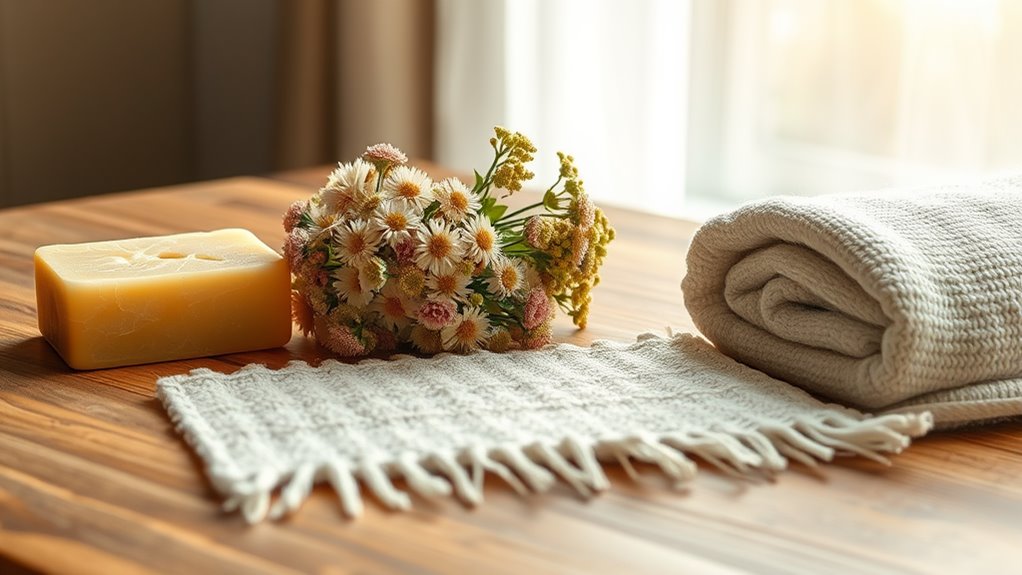Sensitive Skin. Avoid These 5 Common Triggers
If you have sensitive skin, you’re likely dealing with irritation from everyday triggers. Avoiding these five common ones is key to protecting your barrier and staying comfortable. You’ll want to know exactly what they are to make smarter choices now.
Key Takeaways
- Avoid harsh cleansers and soaps containing sulfates, fragrances, and alcohols; opt for gentle, hypoallergenic alternatives.
- Minimize exposure to environmental allergens like pollen and dust mites by keeping living spaces clean and using protective covers.
- Protect skin from extreme temperatures by applying broad-spectrum sunscreen in heat and hydrating moisturizers in cold.
- Stay away from irritating fabrics such as wool and polyester; choose natural, breathable options like cotton or silk.
- Avoid chemical-laden skincare products with sulfates, parabens, and fragrances; select fragrance-free, minimal-ingredient formulas.
Harsh Cleansers and Soaps
Have you ever noticed how harsh cleansers and soaps can wreak havoc on sensitive skin?
They rank among the most common irritants for sensitive skin, often containing sulfates, fragrances, and alcohols that strip away natural oils, disrupt the skin’s barrier, and cause redness, dryness, and inflammation.
You’ll experience irritation from these chemicals, which remove essential moisture and alter pH balance.
To minimize damage, opt for gentle, hypoallergenic alternatives free of these irritants.
Always check labels for potential triggers and perform patch tests, ensuring your skin stays protected and comfortable without unnecessary exposure.
For long-term relief, consider using products with ingredients that strengthen the skin barrier.
Environmental Allergens
Environmental allergens, such as pollen, dust mites, and mold, frequently aggravate sensitive skin by penetrating its weakened barrier and sparking allergic reactions.
You might notice redness, itching, or flare-ups when you’re exposed, so identify your triggers through a skin diary.
To protect yourself, regularly clean your living spaces, use hypoallergenic covers on bedding, and limit outdoor time during high pollen seasons.
If allergens persist, consult a dermatologist for targeted testing.
Additionally, keeping your bedding clean, such as using fresh pillowcases, can minimize the buildup of bacteria and dead skin cells that may worsen sensitive skin conditions.
Extreme Temperatures
Extreme temperatures, such as scorching heat or freezing cold, can wreak havoc on your sensitive skin by disrupting its fragile barrier and causing irritation.
In hot weather, you expose your skin to UV rays that accelerate damage and lead to redness or sunburn. Conversely, cold snaps dry out your skin, triggering flaking and discomfort.
To protect yourself, always apply broad-spectrum sunscreen before going out, use a hydrating moisturizer daily, and layer clothing to maintain warmth.
Stay vigilant; monitor forecasts and adjust your routine to preserve your skin’s health and prevent flare-ups.
Moreover, for enhanced protection in winter, incorporating moisturizing techniques can help sustain your skin’s hydration during harsh conditions.
Irritating Fabrics
Certain fabrics can trigger irritation in your sensitive skin by causing friction, trapping moisture, or harboring allergens, leading to redness, itching, and rashes.
You must avoid wool, which scratches and inflames your skin, and synthetic materials like polyester that don’t breathe well and trap heat.
Instead, choose natural, smooth options such as cotton or silk; they minimize friction and allow air circulation.
Always check labels and opt for hypoallergenic fabrics to prevent flare-ups.
Test new clothing on a small skin area first to ensure it doesn’t cause reactions, keeping your skin comfortable and healthy.
Chemical-Laden Skincare Products
Chemical-laden skincare products can wreak havoc on your sensitive skin by introducing harsh irritants that disrupt its protective barrier. Such products often contain sulfates, parabens, and fragrances that strip oils, cause allergies, or trigger redness and itching. To help you identify risks and safer options, consult this table:
| Chemical | Potential Harm | Safer Alternative |
|---|---|---|
| Sulfates | Strips natural oils | Sulfate-free cleansers |
| Parabens | May cause allergic reactions | Natural preservatives |
| Fragrances | Triggers irritation or rashes | Fragrance-free formulas |
Always read labels, choose minimal-ingredient products, and patch test to safeguard your skin’s health effectively.
Moreover, certain popular ingredients promoted as miracle solutions can damage your skin barrier and result in long-term sensitivity issues.

